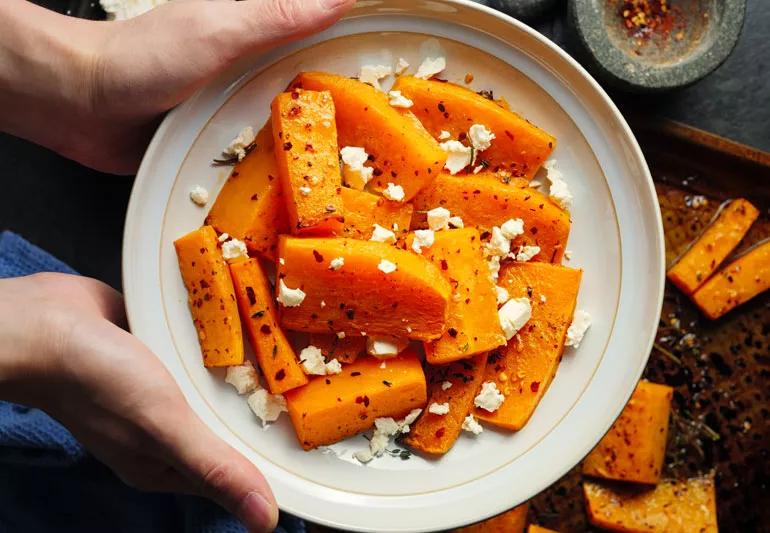High in vitamins C and B6, plus beta-carotene, squash helps with heart and eye health

Just like apples, the varieties of squash are seemingly endless — all with their own unique flavors, shapes and textures. But is squash good for you?
Advertisement
Cleveland Clinic is a non-profit academic medical center. Advertising on our site helps support our mission. We do not endorse non-Cleveland Clinic products or services. Policy
Registered dietitian Amber Sommer, RDN, LD, gives the 411 on the many health benefits of squash, along with how to make them a delicious addition to your diet.
Contrary to popular belief, squash is botanically classified as a fruit, not a vegetable. This is because it grows from flowers and has seeds. But squash brings the best of both produce worlds when it comes to health benefits. “They’re all relatively low in carbs, high in fiber and nutrient-dense,” says Sommer.
For example, winter and summer squash are low in calories and fat, and both are excellent sources of vitamin C. They also contain fiber, B vitamins and important minerals such as potassium and magnesium.
Sommer explains how these antioxidants, minerals and vitamins in squash benefit your health.
Squash contains antioxidants, which prevent cellular damage caused by free radicals. Antioxidants are a nutritional jackpot for your body — no risk and all reward.
“Your body creates free radicals naturally as it converts food into energy or in response to environmental factors like toxins in the air. Free radicals are missing an electron, so they’re constantly looking to steal them from other cells,” explains Sommer.
“Too many free radicals create oxidative stress. Over time, oxidative stress causes cell damage and lays the foundation for disease development. But antioxidants fight free radicals, preventing this damage and staving off chronic ailments like cancer and heart disease.”
Advertisement
Beta-carotene is an antioxidant found in squash. Your body transforms beta-carotene into the essential nutrient vitamin A. Studies have also linked beta-carotene to a lower risk of cancers, including:
Squash is rich in minerals, including calcium. Calcium helps build and maintain healthy bones and teeth. The vitamins A and C in squash also help keep your bones healthy. In fact, a 2017 review of studies linked vitamin A deficiency to an increased risk of bone fractures.
Squash is a great source of iron. Iron deficiency can cause a host of problems, including anemia. Getting enough iron doesn’t just help prevent and treat anemia. “Research also shows that iron has benefits during menstruation, such as reducing fatigue and improving athletic performance,” notes Sommer.
Squash contains magnesium, which is essential for more than 300 processes in your body. “Magnesium maintains your heart rhythm and helps make DNA. It can also help you stay energized,” says Sommer.
Potassium-rich foods like squash also help your body function by supporting your heart and can help lower blood pressure. “And research has linked the beta-carotene in squash with heart disease prevention,” she adds.
Squash is a smorgasbord of powerhouse vitamins, including vitamins A and C. Studies show that vitamin A can help protect your eyes and plays a role in preventing night blindness and age-related macular degeneration.
In addition to being an immune health superhero and powerful antioxidant, vitamin C helps your eyes, too. Like vitamin A, it prevents and slows macular degeneration and may also help prevent cataracts.
Studies show that vitamin C and beta-carotene are good for skin health. Vitamin C is also connected with wrinkle prevention and wound healing.
Despite being #teamfruit, the U.S. Department of Agriculture (USDA) lumps squash in with veggies based on their nutrition content. According to MyPlate, the USDA’s nutrition guide for Americans, you should aim for two to four servings of vegetables daily. Where you fall in that range depends on your sex, age, activity level, height and weight. The USDA considers 1 cup of cubed, sliced or diced winter or summer squash to be one serving of vegetables.
“Nutritionally, butternut and acorn squash are arguably the overall MVPs, but it’s by the slimmest, most subjective of margins,” says Sommer. “However, don’t worry about choosing the healthiest squash. Instead, choose the ones that taste best to you and try to eat a variety to get the most benefit from eating squash.”
Advertisement
Try summer squash raw or spiraled into “zoodles” as a healthy substitution for noodles. They’re also yummy sautéed or roasted with olive oil. Winter squash is delicious (and sugary sweet like a sweet potato) when roasted. And both are great additions to soups and pastas.
Whether you add it to your favorite recipe or eat squash on its own, your body will thank you.
Advertisement
Learn more about our editorial process.
Advertisement

The tropical fruit is a good source of antioxidants and vitamin C

High amounts of cholesterol and saturated fat in red meat may be linked to heart disease

The leaves and pods from this tree are rich in essential nutrients

This starchy root vegetable is a staple in many global cuisines — but it has to be prepared correctly, or it can cause serious concerns

These delicate green sprouts can give you an extra dose of vitamin K and other nutrients — but they’re not safe for everyone

Edamame, lentils and chicken breast are good sources of protein

Eating this root vegetable can help support your eye, heart and brain health

The flavorful herb is full of antioxidants that may help regulate blood sugar

Wearing a scarf, adjusting your outdoor activities and following your asthma treatment plan can help limit breathing problems

Your diet in the weeks, days and hours ahead of your race can power you to the finish line

When someone guilt trips you, they’re using emotionally manipulative behavior to try to get you to act a certain way